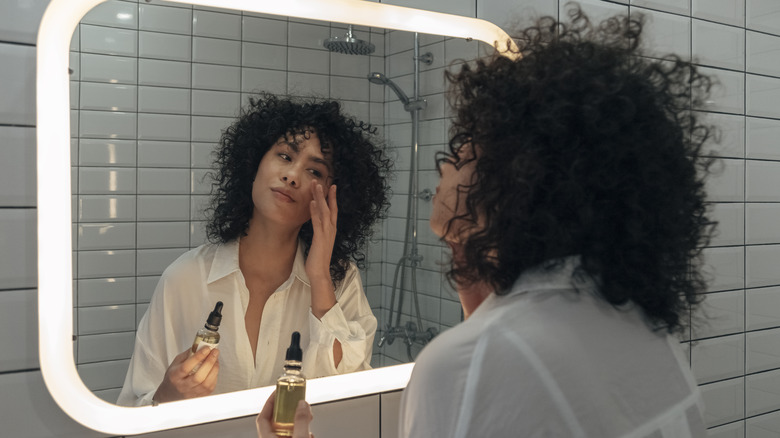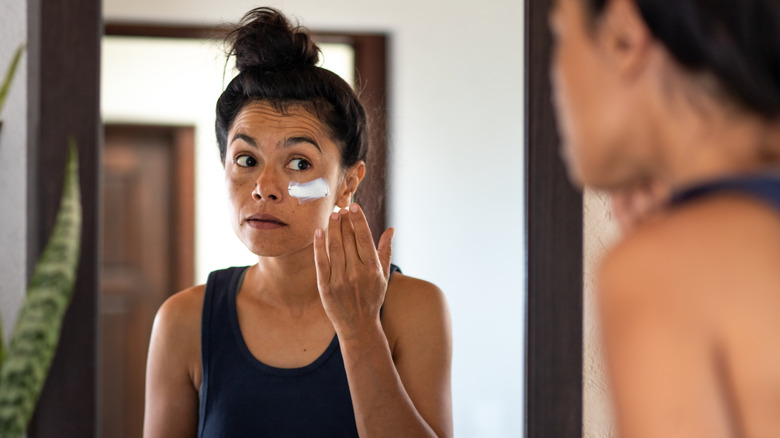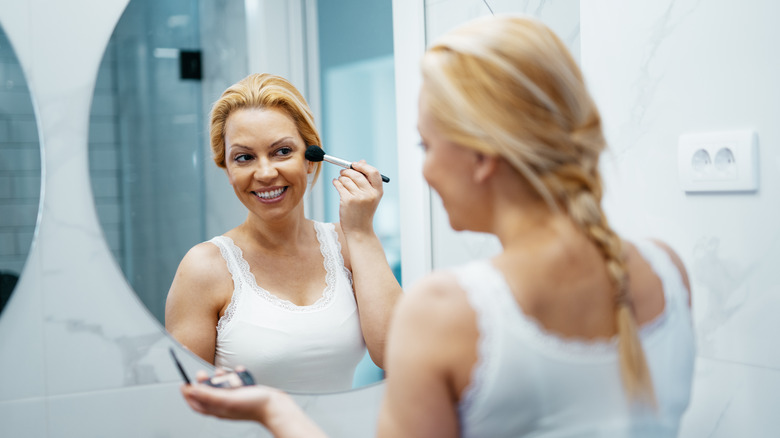When Should Sunscreen Be Applied During Your Skincare Routine? The Answer Is Complicated
No matter what time of year it is, putting on sunscreen is always a good idea. And chances are, you've heard by now that the SPF 15 in your foundation isn't gonna cut it for protecting your skin. A separate, daily sunscreen is a necessity. But with so many different products going onto our face and body on a daily basis, it can be tricky to know exactly what order our skincare products should be applied. Among the discussion, there's one lingering question: Do you apply sunscreen before or after moisturizer?
There are differing opinions out there. Joshua Zeichner, director of cosmetic and clinical research in dermatology at Mount Sinai Hospital told Allure it's best to apply sunscreen directly onto clean, bare skin. The reason? Other products can impact how well the sunscreen absorbs into your skin. "You do not want to apply anything that will interfere with [sunscreen's] penetration," he explained. However, other experts argue that putting your other skincare (such as your vitamin C serum or niacinamide) on after sunscreen increases the risk of diluting the SPF. "When moisturizer is applied after sunscreen, it can actually change the properties of your sunscreen. It can also alter the way that UV rays meet your skin," dermatologist Dr. Sejah Shah noted to Allure.
It depends on what kind of sunscreen you're using
Although there is no universal rule for when to apply sunscreen, most dermatologists agree that it depends on what kind you're using — chemical or physical. Chemical sunscreens rely on active ingredients like oxybenzone, octocrylene, and avobenzone to soak up UV rays. Because their effectiveness is contingent on penetrating into the skin, it's crucial that nothing interferes with their absorption. "If you're using a chemical sunscreen, it should be applied before the moisturizer, since the sunscreen needs to get absorbed into the skin," dermatologist Dr. Mamina Turegano tells Ipsy. She further points out that this means you should never premix your moisturizer and chemical sunscreen together, as it could mess with the formulation of both products.
On the other hand, mineral sunscreens (also known as physical sunscreens), work by using zinc oxide to create a shield on the top of the skin that reflects the UV rays. This means, unlike chemical formulas, you don't have to worry too much about when you apply it in your routine. "It is not as important for them to be applied as a first layer. In fact, they can be applied as your last layer as a protective coating against the sun," Joshua Zeichner told Allure. However, it's still best to apply physical sunscreen before makeup, as it can leave a white cast or residue that may affect your overall look.
Always wait two minutes before applying makeup
Whether you're using chemical or physical sunscreen, it's important that you wait for it to fully sink into your skin before applying anything else. Applying makeup too soon As a general reminder, sunscreen takes around 15 minutes to completely absorb into the skin. But that doesn't necessarily mean you have to wait that long to put things like makeup over the top. Dermatologist Dr. Kiran Mian told The New York Times that you after about two minutes, the sunscreen should be completely dry, meaning you're safe to start applying other products, like foundation or primer. However, if even after five minutes of waiting, you notice your products start pilling, then you may want to consider switching sunscreen formulas.
Don't think you're done for the day once you've applied your makeup, though. No, no. To properly protect your skin, it's still important to reapply sunscreen every two hours. Of course, when you have a full face of foundation, blush, and powder, that's easier said that done. However, to keep your look in tact, experts recommend topping off with an SPF mineral powder, as this won't make your skin look greasy. Meanwhile, if you're looking for something less mattifying, an SPF facial spritz can work as an effective top-up.


